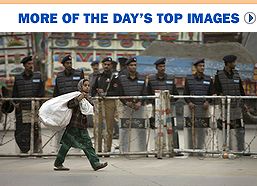In a significant geopolitical development, U.S. President George W. Bush urged Pakistani President Pervez Musharraf to step down from his military post and facilitate the conduct of democratic elections. This pronouncement, made against the backdrop of Pakistan’s troubled political landscape, carries profound implications for both internal stability in Pakistan and U.S. foreign policy interests in the region. As clashes between state forces and political dissidents continue, the call for democratic governance has become increasingly pressing.
The impetus behind Bush’s appeal stems from the burgeoning concern over Musharraf’s dual role as both military chief and president. Critics argue that this concentration of power undermines the principles of democracy, leading to an erosion of civil liberties, rampant human rights violations, and widespread political disenfranchisement. The call for Musharraf’s resignation is not simply an isolated plea but a reflection of a broader desire for reform, emphasizing the need for a transition towards a more inclusive and representative political framework.
Moreover, the political climate in Pakistan has been characterized by escalating tensions, particularly following the imposition of emergency rule by Musharraf in 2007. This drastic measure provoked widespread protests and a backlash from a populace yearning for democratic restoration. Consequently, Bush’s emphasis on electoral processes can be viewed as an attempt to stabilize a volatile situation while reassuring both domestic and international stakeholders of the U.S.’s commitment to democracy.
It is essential to analyze the ramifications of this call on the intricate tapestry of Pakistani politics. The prospect of Musharraf stepping down poses both opportunities and challenges. Should Musharraf comply, it may lead to the emergence of a new political order, potentially reinvigorating democratic institutions. However, the power vacuum created by such a transition could also precipitate instability, inviting rival factions to vie for control, complicating an already intricate socio-political landscape.
Additionally, it is crucial to consider the international implications this call carries. The stability of Pakistan has far-reaching consequences, particularly in the context of regional security and U.S. anti-terrorism efforts. The Pakistan Army, a critical ally in the fight against extremism, must navigate this precarious moment with caution. The balance of military influence and civilian governance is pivotal for maintaining peace, thwarting extremist elements, and fostering prosperity in a nation beset by challenges.
In conclusion, President Bush’s directive for Musharraf to relinquish his military authority and initiate elections is emblematic of a broader narrative advocating for democratic governance in regions plagued by autocracy. Its outcomes will not only reverberate through Pakistan but also reshape the geopolitical chessboard within South Asia. As the world watches, the unfolding events will undoubtedly be pivotal in determining the future trajectory of one of the most strategically significant countries in the world.
